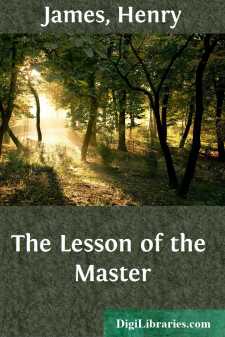Categories
- Antiques & Collectibles 13
- Architecture 36
- Art 48
- Bibles 22
- Biography & Autobiography 813
- Body, Mind & Spirit 142
- Business & Economics 28
- Children's Books 17
- Children's Fiction 14
- Computers 4
- Cooking 94
- Crafts & Hobbies 4
- Drama 346
- Education 46
- Family & Relationships 57
- Fiction 11829
- Games 19
- Gardening 17
- Health & Fitness 34
- History 1377
- House & Home 1
- Humor 147
- Juvenile Fiction 1873
- Juvenile Nonfiction 202
- Language Arts & Disciplines 88
- Law 16
- Literary Collections 686
- Literary Criticism 179
- Mathematics 13
- Medical 41
- Music 40
- Nature 179
- Non-Classifiable 1768
- Performing Arts 7
- Periodicals 1453
- Philosophy 64
- Photography 2
- Poetry 896
- Political Science 203
- Psychology 42
- Reference 154
- Religion 513
- Science 126
- Self-Help 84
- Social Science 81
- Sports & Recreation 34
- Study Aids 3
- Technology & Engineering 59
- Transportation 23
- Travel 463
- True Crime 29
Sort by:
by:
Henry James
CHAPTER I A narrow grave-yard in the heart of a bustling, indifferent city, seen from the windows of a gloomy-looking inn, is at no time an object of enlivening suggestion; and the spectacle is not at its best when the mouldy tombstones and funereal umbrage have received the ineffectual refreshment of a dull, moist snow-fall. If, while the air is thickened by this frosty drizzle, the calendar should...
more...
by:
Henry James
CHAPTER I He had been told the ladies were at church, but this was corrected by what he saw from the top of the steps—they descended from a great height in two arms, with a circular sweep of the most charming effect—at the threshold of the door which, from the long bright gallery, overlooked the immense lawn. Three gentlemen, on the grass, at a distance, sat under the great trees, while the...
more...
by:
Henry James
It relates to my youth, and to Italy: two fine things! (H--- began). I had arrived late in the evening at Florence, and while I finished my bottle of wine at supper, had fancied that, tired traveller though I was, I might pay the city a finer compliment than by going vulgarly to bed. A narrow passage wandered darkly away out of the little square before my hotel, and looked as if it bored into the...
more...
by:
Henry James
THE DIARY OF A MAN OF FIFTYby Henry James Florence, April 5th, 1874.—They told me I should find Italy greatly changed; and in seven-and-twenty years there is room for changes. But to me everything is so perfectly the same that I seem to be living my youth over again; all the forgotten impressions of that enchanting time come back to me. At the moment they were powerful enough; but they afterwards...
more...
by:
Henry James
The litigation seemed interminable and had in fact been complicated; but by the decision on the appeal the judgement of the divorce-court was confirmed as to the assignment of the child. The father, who, though bespattered from head to foot, had made good his case, was, in pursuance of this triumph, appointed to keep her: it was not so much that the mother's character had been more absolutely...
more...
by:
Henry James
PART I At the little town of Vevey, in Switzerland, there is a particularly comfortable hotel. There are, indeed, many hotels, for the entertainment of tourists is the business of the place, which, as many travelers will remember, is seated upon the edge of a remarkably blue lake—a lake that it behooves every tourist to visit. The shore of the lake presents an unbroken array of establishments of this...
more...
by:
Henry James
On the morrow, in the evening, Lord Warburton went again to see his friends at their hotel, and at this establishment he learned that they had gone to the opera. He drove to the opera with the idea of paying them a visit in their box after the easy Italian fashion; and when he had obtained his admittance—it was one of the secondary theatres—looked about the large, bare, ill-lighted house. An act...
more...
by:
Henry James
"Olive will come down in about ten minutes; she told me to tell you that. About ten; that is exactly like Olive. Neither five nor fifteen, and yet not ten exactly, but either nine or eleven. She didn't tell me to say she was glad to see you, because she doesn't know whether she is or not, and she wouldn't for the world expose herself to telling a fib. She is very honest, is Olive...
more...
by:
Henry James
A SMALL BOY AND OTHERS I In the attempt to place together some particulars of the early life of William James and present him in his setting, his immediate native and domestic air, so that any future gathered memorials of him might become the more intelligible and interesting, I found one of the consequences of my interrogation of the past assert itself a good deal at the expense of some of the...
more...
by:
Henry James
I Strether's first question, when he reached the hotel, was about his friend; yet on his learning that Waymarsh was apparently not to arrive till evening he was not wholly disconcerted. A telegram from him bespeaking a room "only if not noisy," reply paid, was produced for the enquirer at the office, so that the understanding they should meet at Chester rather than at Liverpool remained to...
more...











